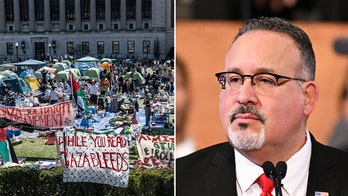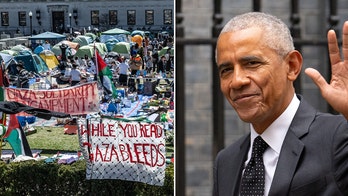Energy Secretary Steven Chu said Thursday he doesn't think taxpayers will recover much of their $528 million loan to bankrupt solar firm Solyndra, calling the situation "extremely unfortunate" while continuing to defend his actions to prop up the company before its failure.
Chu testified Thursday for the first time before the House committee investigating the Solyndra loan. He insisted that the decision in late 2009 to approve the loan guarantee was his own and "absolutely was made only on the merits." He said it was not influenced by political considerations.
But he acknowledged that chances are dim for taxpayers to see their money returned as Solyndra goes through bankruptcy proceedings.
Asked how much money taxpayers might get back, Chu said: "Well, that remains to be seen. I'm anticipating that not very much."
While declining to offer a personal apology over the situation, Chu expressed disappointment in the fate of Solyndra and said the buck stopped with him when it came to decisions made by the Energy Department about the company.
Chu claimed he was looking out for the taxpayer all along when reviewing the Solyndra finances.
"As the Secretary of Energy, the final decisions on Solyndra were mine, and I made them with the best interest of the taxpayer in mind," Chu said in testimony before the House Energy and Commerce Committee. "And I want to be clear: over the course of Solyndra's loan guarantee, I did not make any decision based on political considerations."
He said the White House never pressed him to take any action on the loan.
Chu is the highest-ranking official to testify on the scandal, and Republicans on the committee were eager to grill him on his involvement and on why he overrode concerns from his own subordinates about Solyndra's financial situation.
Rep. Fred Upton, D-Mich., chairman of the committee, described the testimony as an "important piece of the overall puzzle." He accused the department of ignoring concerns about the company dating back to early 2010.
"Officials were shrugging it off and calling it par for the course," Upton claimed.
Democrats, though, continued to accuse the GOP majority of leading a politically motivated investigation.
Rep. Diana DeGette, D-Colo., while saying she has serious questions about the Solyndra deal, accused Republicans of "firing partisan broadsides at the Obama administration." The ranking Democrat on the subcommittee complained about the recent Republican decision to issue a subpoena to the White House over Solyndra despite "good-faith efforts" by the White House to comply.
Chu said his decision to approve the $528 million Solyndra loan was based on the analysis of experienced professionals and on the strength of the information they had available to them at the time.
He claimed the investigation into the matter should back up his claims that the department believed the loan was viable.
"As you know, the department has consistently cooperated with the committee's investigation, providing more than 186,000 pages of documents, appearing at hearings, and briefing or being interviewed by committee staff eight times," he said. "As this extensive record has made clear, the loan guarantee to Solyndra was subject to proper, rigorous scrutiny and healthy debate during every phase of the process."
Chu said the main reason Solyndra went belly up was because the price of solar panels "dropped precipitously" -- partly because China was ramping up production, partly because demand was softening in Europe.
Chu also took responsibility for a later decision to approve a restructuring of Solyndra's debt that allowed two private investors to move ahead of taxpayers for repayment in case of default
Chu faced tough questioning Thursday from House Republicans who are investigating the $528 million federal loan received by solar panel maker Solyndra before it went belly up, laying off its 1,100 workers.
In a joint statement, Upton and Rep. Cliff Stearns of Florida said they intend to find out how decisions were made to guarantee and loan more than $500 million to Solyndra. Upton chairs the energy panel while Stearns heads a subcommittee on investigations.
"We want to find out why the administration restructured the loan after Solyndra had reached a technical default, and how they explain putting private investors in line ahead of taxpayers. And we need to understand how all the warnings, from inside and outside the Department of Energy, were ignored and this risky bet was allowed to happen," Stearns and Upton said.
The Energy Department faced a difficult decision in late 2010 and early this year, Chu said: Force Solyndra into immediate bankruptcy or restructure the loan guarantee to allow the company to accept emergency financing that would be paid back first if the company was still unable to recover.
"Immediate bankruptcy meant a 100 percent certainty of default, with an unfinished plant as collateral. Restructuring improved the chance of recovering taxpayer money by giving the company a fighting chance at success," Chu said in his written testimony.
Although both options involved significant uncertainty, Chu said he made the judgment that restructuring was the better option to recover the maximum amount of the government's loan. The decision also meant continued employment for the company's approximately 1,100 workers, he said.
Chu said it was worth noting that U.S. taxpayers remain first in line for repayment of the initial loan and noted that private groups invested nearly $1 billion in the company.
Solyndra faced another crisis in August, Chu said. This time, after consulting with outside analysts, he decided that the U.S. should not provide additional support to Solyndra. Days later, the company filed for bankruptcy.
While "disappointed," Chu said the U.S. should continue to support clean energy.
"When it comes to the clean energy race, America faces a simple choice: compete or accept defeat. I believe we can and must compete," he said.
Solyndra was the first renewable-energy company to receive a loan guarantee under the 2009 stimulus law, and the Obama administration frequently touted the company as a model for its clean energy program. Chu attended a 2009 groundbreaking when the loan was announced, and President Barack Obama visited the company's Fremont, Calif., headquarters last year.
Since then, the company's implosion and revelations that the administration hurried a review of the loan in time for the September 2009 groundbreaking has become an embarrassment for Chu and Obama and a rallying cry for GOP critics of the administration's green energy program.
The Obama administration is fighting back, circulating documents showing that Upton sought the Energy Department's assistance on behalf of a solar company in his home state that, like Solyndra, recently announced it is halting operations.
But Upton spokeswoman Alexa Marrero said it is "ultimately the role of the agency" to vet the applications, which is what Marrero said the Michigan delegation asked the department to do.
"Many in Congress questioned whether the stimulus would produce the promised jobs -- at the same time, members on both sides of the aisle wanted to see jobs created and folks put back to work, especially in Michigan," Marrero said.
The Associated Press contributed to this report.




